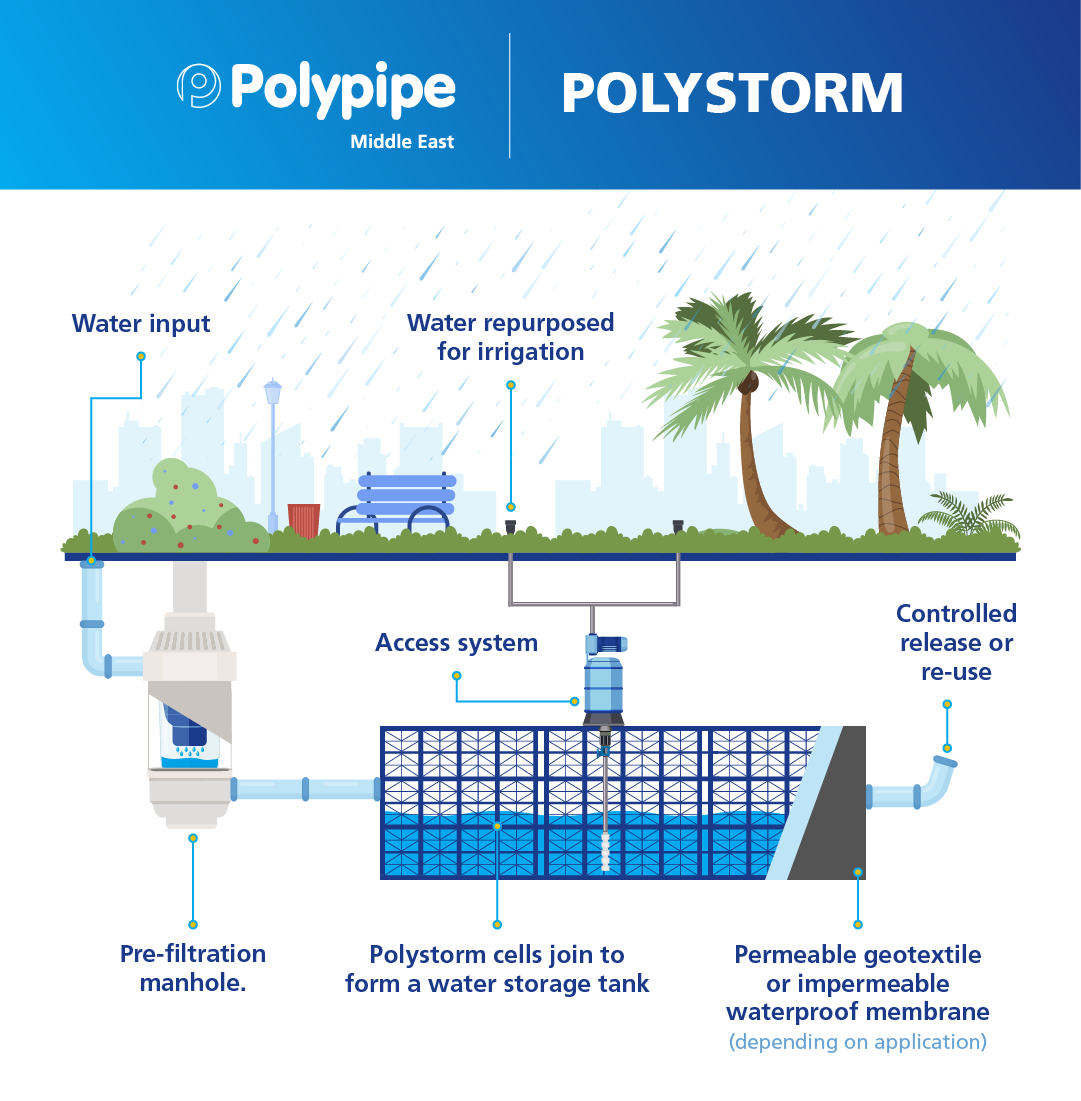Polystorm - Geocellular Water Management System
Polystorm is an efficient and versatile geocellular water management system for Sustainable urban Drainage Systems (SuDS) compliant attenuation, det

What is happening on the football pitch is of course impressive, but what the FIFA World Cup Qatar 2022 is achieving in the wider socio-political environment is monumental. As the first World Cup held in the Middle East, the revolutionary event is changing Western perceptions of the Arab World.
The locality of this World Cup has presented the GCC with a valuable opportunity to prove themselves as equal to their Western counterparts - in terms of technology, economy, and most importantly, quality of life. The new and improved reputation is positioning the region as an increasingly attractive place to live and work. So much so that by 2048, the population of the GCC is expected to have grown by an additional 17%[1].
As a result, cities are having to expand rapidly to accommodate the influx of expats, meaning vegetation and greenery are being sacrificed in favour of concrete and man-made structures. The resulting impervious surfaces, which cover up to 95% of densely populated urban areas[2], are exacerbating an already dangerous and expensive problem in the region: floods.
What once only caused significant damage every 10 years or so, has become an annual occurrence as climate change wreaks havoc on regional rainfall patterns. The warmer atmosphere, capable of holding 7% more water with every 1°C rise[3], triggers more intense rainfall within a shorter time frame, despite overall precipitation levels decreasing. Not only does this increase the risk of flash floods, it also heightens the regional issue of water security.
The intense and erratic storms, combined with predominantly impervious urban landscapes, generate overwhelming surges of surface runoff, with no means of escape. The rarely used drain inlets are clogged with sand and the wider network of gutters, pipes and tunnels was never designed to cope with high volumes of stormwater.
Thankfully, there is one solution that can address flood risk, climate change and water scarcity simultaneously: sponge cities.
What is a Sponge City?
The term is used to describe urban environments designed to absorb water like a sponge, through the incorporation of natural elements such as trees, lakes and parks. These cities recognise the value in nature-based water management solutions and utilise innovative source control technologies that mitigate flood risk and minimise surface runoff.
Common features of sponge cities:
Not only are these nature-based water management solutions 50% more affordable and 28% more effective than man-made solutions[4], but they also present a wider array of benefits. Sponge cities are a great example of green urbanisation in practice and experience all the same advantages, such as reduced urban heat island effect, increased biodiversity, improved quality of life, and higher property/land values. To learn more about these benefits, read our blog on green urbanisation.
How Can We Create Sponge Cities?
With the imminent population increase calling for urban expansion within all GCC states, governments must adopt a multifunctional but low-cost water management scheme. This will rely on the implementation of two principal strategies: soakaway and retention.
Soakaway solutions capture and filter stormwater before slowly releasing the water back into the surrounding soil. The controlled release helps to avoid oversaturating the land or overwhelming conventional drainage networks. Our Storm-X4 treatment system is designed to remove unwanted particles, silt and heavy metals from surface water using the latest four-stage upward filtration technology, ensuring no pollutants make their way into the soil.
Advantages of a soakaway:
Retention solutions follow the same process of capturing and filtering surface runoff, but instead of releasing the water back into the soil, these systems store the water in underground tanks, wrapped in an impermeable waterproof membrane until the owner is ready to use it.
Advantages of retention systems:
Given the arid climate in the region, governments are faced with a catch 22 situation: they recognise the need for green spaces to combat climate change, but they’re also conscious of the masses of water required to maintain these spaces. Retention solutions solve the dilemma by helping to irrigate vegetation and restore ecological balance, without placing excess strain on the already limited water resources. They’re therefore an important component in the broader sponge city model and that can even be used in the creation of green roofs to boost property values and lower city-wide carbon emissions.
Geocellular Water Management Solutions
At Polypipe Middle East, we go one step further. Our multi-award winning Permavoid Geocellular System does more than simply retain water. It uses innovative wicking technology to enable passive irrigation and maintain soil moistness of up to 45%. Water travels out of the cells through Capillary Cones and into the surrounding soil, replacing the moisture lost through evapotranspiration. By doing so, the vegetation consumes water on a demand-only basis, making this method 40% more efficient than over-soil irrigation.
Polystorm is another example of a sustainable water management solution that offers the option of either soakaway or retention, depending on the owner’s objective. Each Polystorm cell can store up to 190 litres, making the solution incredibly effective in the event of a flash flood. Check out the diagram below to understand how this system works.

Countries around the world must learn to adapt to the changing climate if they are to continue to prosper. Modern drainage solutions need to provide more than just conveyance, they need to deliver multifunctional benefits that transform challenges into solutions
To find out more about how Polypipe Middle East can help you to adopt sustainable water management practices through bespoke, fit-for-purpose solutions, don’t hesitate to contact our technical team now.
Tel: +971 (0) 4 518 3000
Email: middleeast@polypipe.com
[1] https://www.marmoremena.com/en/insights/gcc-population-will-be-lesser-and-older-by-the-end-of-this-century/
[2] https://news.climate.columbia.edu/2010/07/13/no-more-pavement-the-problem-of-impervious-surfaces/
Polystorm is an efficient and versatile geocellular water management system for Sustainable urban Drainage Systems (SuDS) compliant attenuation, det
Permavoid is a shallow geocellular water management system aimed at managing stormwater and surface water at source, as close to where it falls as pos
Storm-X4 range is a range of geocellular products for use beneath both trafficked and non-trafficked surfaces in the Middle East. It is ideal for buil